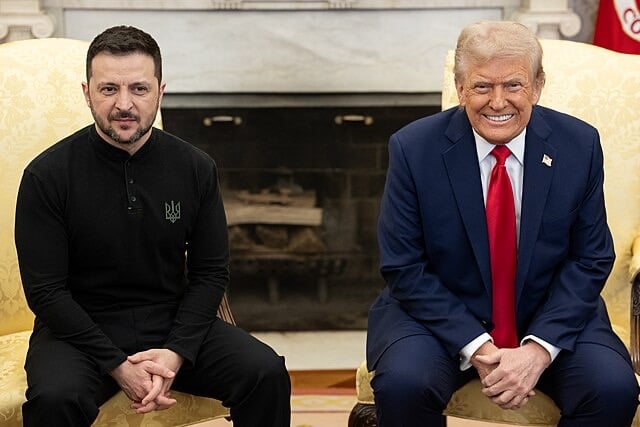In a dramatic shift signaling the potential realignment of U.S. foreign policy, President Donald Trump has reportedly told Ukrainian President Volodymyr Zelensky that Ukraine must negotiate peace with Russia without relying on American intervention. This bombshell declaration came on the heels of a two-hour phone conversation between Trump and Russian President Vladimir Putin—one that insiders describe as unusually cordial and constructive.
This message from Trump has sent shockwaves through Europe, Ukraine, and global diplomatic circles. It suggests a possible hands-off approach to the ongoing Russia-Ukraine war from the United States, despite the long-standing support for Kyiv in its fight against Russian aggression. Trump’s remarks have not only stirred concerns about America’s global leadership but also about the implications for NATO and the balance of power in Eastern Europe.
Inside the Two-Hour Trump-Putin Call
President Trump’s call with Vladimir Putin has been described as a pivotal moment in the war’s geopolitical narrative. According to sources close to the administration, Trump praised the “impressive” potential for future U.S.-Russia relations. While the full details of the call remain classified, it reportedly included a discussion of potential peace efforts, economic cooperation, and international stability.
What stood out most was Trump’s acknowledgment of Putin’s resolve. He reportedly told his aides and several international partners afterward that “Putin believes he’s winning, and he’s not ready to end the war.” Rather than pressing Russia toward a ceasefire, Trump used the opportunity to distance America from the conflict, reinforcing that “only he and Putin could end the war” before then putting the onus squarely on Ukraine and Russia to work things out.
This call not only confirmed Trump’s unique diplomatic approach—often centered on personal rapport—but also reinforced his previous statements suggesting a belief in strongman diplomacy. His “America First” doctrine appears to now extend to walking away from foreign entanglements, even those involving democratic allies like Ukraine.
Trump’s Message to Zelensky and Europe
Following the Putin call, President Trump reportedly reached out to Ukrainian President Volodymyr Zelensky and several European leaders with a stark message: the U.S. would not lead or broker future peace negotiations. In essence, Trump told Zelensky that Ukraine would need to “make peace with Russia on its own terms,” indicating a drastic pullback in American diplomatic and military involvement.
This message was met with disbelief and concern from both Kyiv and European capitals. For years, Ukraine has relied on the support of the United States—financially, militarily, and diplomatically—to resist Russia’s full-scale invasion. Now, Trump’s posture implies that Ukraine may have to compromise or capitulate without robust Western backing.
European leaders, according to diplomatic insiders, were “stunned” by Trump’s apparent deference to Putin during the call. France and Germany, who have played key roles in previous peace talks like the Minsk agreements, are now reportedly scrambling to reassess their strategic options in a post-American-led peace scenario.
This communication also undermines NATO’s collective message of unity and shared defense. If the United States disengages from the conflict diplomatically, many fear that Europe alone may not be able to uphold the pressure necessary to deter further Russian aggression.
Trump’s Position: From Power Broker to Passive Bystander
Donald Trump has previously boasted that he alone could end the war in Ukraine “in 24 hours” if given the chance. This latest move, however, seems to contradict those claims and marks a transition from self-appointed peacemaker to passive bystander.
The rationale behind Trump’s change in stance is reportedly rooted in his broader geopolitical philosophy. By removing the U.S. from the core of the conflict, he aims to de-escalate America’s global military commitments and focus inward. This is part of his “America First” legacy, which views prolonged foreign interventions as costly and counterproductive.
Critics argue that this approach emboldens authoritarian leaders like Putin while isolating democratic allies. Supporters, however, suggest that Trump is pragmatically acknowledging geopolitical reality—that the war cannot be solved through Western pressure alone and that Ukraine must eventually come to the negotiating table.
This move could redefine not only America’s role in global diplomacy but also the internal dynamics of conflict resolution strategies worldwide.
European Reactions and Concerns
In Brussels, Berlin, and Paris, Trump’s remarks have triggered diplomatic panic. European leaders, already stretched by the economic and military strains of supporting Ukraine, are now grappling with the possibility of leading peace negotiations without U.S. support.
NATO Secretary-General Jens Stoltenberg called an emergency session following the news, while French President Emmanuel Macron issued a veiled criticism, emphasizing “the need for sustained unity among allies in the face of tyranny.” German Chancellor Olaf Scholz echoed these sentiments, warning that “abandonment invites aggression.”
Eastern European countries—particularly Poland, the Baltic states, and Romania—are especially nervous. They have always seen U.S. leadership as a vital counterweight to Russian ambitions. Trump’s pivot could signal a broader strategic withdrawal from Europe, risking increased vulnerability along NATO’s eastern flank.
While Zelensky has not publicly responded in detail, Ukrainian officials have reiterated the necessity of American involvement for a fair and lasting peace. There is fear that direct negotiations with Russia, without strong Western mediation, would result in territorial concessions and legitimization of Russia’s military tactics.



